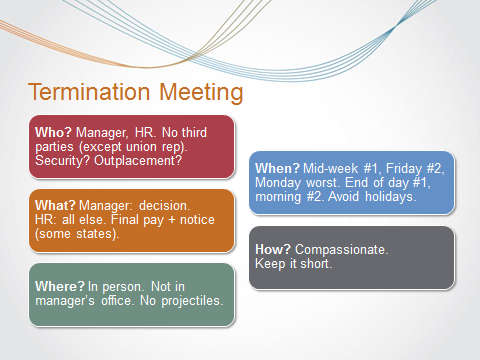This week, we’ve been taking on one of the most terrifying topics in the employment law universe: terminations.
First, we gave you our official Top 11 Termination Troubles (Top 11 Troubles When You Do a Termination).
Then, we gave you a handy test that you can use to make sure that each and every one of your terminations is legally (and maybe even morally) defensible. You can find it here.
Today, we close the week with our patented guide to one of the most frightening occurrences in the workplace: the termination meeting.
Here’s a brief summary of what it all means.
- Who? We recommend that the manager and an HR representative be there. No third parties need be allowed to attend (even if the employee demands that his/her attorney be present). The one exception would be a union representative, if demanded.
- What? The manager should communicate the decision. The HR representative should communicate everything else. We highly recommend that each of them have carefully prepared talking points to ensure that the discussion doesn’t veer off course. Some states require final pay and a specific notice be given at the meeting pair (e.g., California).
- Where? The meeting should be held in person and never ever conducted via the phone. (Please don’t be like George Clooney.) don’t hold the meeting in the manager’s office and be sure to remove any potentially dangerous projectiles from the area.
- When? Based on recent studies and lots of discussions with HR professionals over the years, most agreed that mid-week is the best time to conduct the meeting, followed by Friday as the second-best choice. Most also agree that Monday is the worst day to conduct the meeting. As for the time of day, experts generally agreed that the end of the day is the best with morning being second best. Please please please never conduct a termination meeting just prior to a major holiday.
- How? Always always always treat the departing employee with dignity and respect. Be compassionate. Keep it short. Treat the departing employee the way you would like to be treated.
This was originally published on Manpower Group’s Employment Blawg.

